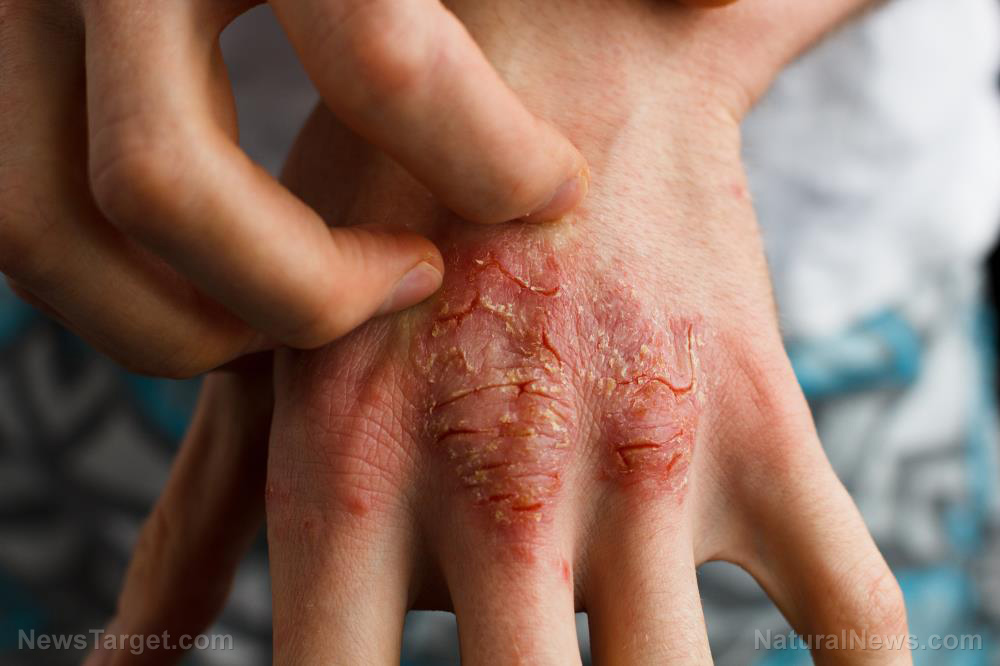Eczema’s hidden toll: Study reveals shocking 55% higher suicide risk in sufferers
09/18/2025 / By Cassie B.

- Eczema patients face a 55% higher risk of suicidal thoughts due to sleep disorders, social stigma, and ineffective conventional treatments.
- Big Pharma profits from toxic steroid creams and immunosuppressants that worsen mental health while ignoring safer, natural alternatives.
- Chronic inflammation from eczema disrupts brain function, increasing anxiety, depression, and ADHD risks.
- Dietary changes, probiotics, and natural anti-inflammatories like evening primrose oil and curcumin can reduce eczema severity without drugs.
- The medical system dismisses eczema’s mental toll, prioritizing profit-driven drugs over holistic solutions that address root causes.
When dermatologists gathered in Paris for the European Academy of Dermatology Congress, they unveiled a disturbing truth: adults with atopic eczema aren’t just battling itchy skin—they’re fighting a silent mental health epidemic.
A groundbreaking study of more than 30,800 adults across 27 countries found that 13.2% of eczema patients reported suicidal thoughts, compared to just 8.5% of those without the condition. That’s a 55% higher risk—a statistic so alarming it demands urgent attention from a medical system that has long dismissed eczema as “just a skin problem.”
The research, dubbed the “Scars of Life” study, exposed a crisis hiding in plain sight. Younger adults under 30, obese individuals, and those with moderate-to-severe symptoms faced the highest risks. But the most damning revelation? Sleep disorders and social stigmatization—both aggravated by conventional treatments—were strongly linked to suicidal ideation.
“The effects of atopic eczema are more than skin deep,” warned lead researcher Dr. Delphine Kerob. Yet despite these findings, Big Pharma and captured health agencies continue pushing toxic steroid creams and immunosuppressants—drugs that often worsen mental health while lining pharmaceutical pockets.
A system that ignores the suffering
The medical-industrial complex has long treated eczema as a superficial issue, prescribing topical steroids (which thin the skin and disrupt hormones) and immunosuppressants (which ravage the liver and immune system). Meanwhile, patients suffer in silence.
“Atopic dermatitis often has a greatly underestimated psychosocial burden for the patients and their families,” admitted Professor Tony Bewley, a consultant dermatologist at Bart’s Health NHS Trust. Bullying, sleep deprivation, and relentless itching create a perfect storm for depression, yet doctors rarely address the root causes.
Worse still, the study found that stigmatization—being mocked, avoided, or treated as “contagious”—dramatically increased suicidal thoughts. “You really have to be a poor clinician or very unskilled observer not to see it,” said Jacob Thyssen, a dermatologist at Copenhagen University Hospital.
Yet instead of holistic solutions, the system doubles down on profit-driven drugs. The NHS recently rolled out lebrikizumab, a monoclonal antibody jab targeting inflammation—but at what cost? Long-term immunosuppression carries its own risks, from infections to cancer, yet no one questions whether diet, gut health, or natural anti-inflammatories could offer safer relief.
The inflammation-brain connection
Science confirms what eczema sufferers have known for years: chronic inflammation doesn’t stay in the skin. Studies show that cytokines—immune messengers like IL-4 and IL-13—don’t just trigger itching; they cross into the brain, fueling anxiety, depression, and even ADHD.
“When you interrupt these inflammatory pathways, patients improve in many domains: anxiety, sleep, depression, overall quality of life,” explained Dr. Brian Kim, a neuroimmunologist at Mount Sinai. Yet instead of targeting inflammation at its source—gut health, diet, and environmental toxins—doctors prescribe band-aid drugs that mask symptoms while worsening mental health.
The atopic march—where eczema leads to food allergies, asthma, and neuropsychiatric disorders—isn’t a coincidence. Poor sleep, a hallmark of eczema, doubles the risk of ADHD and depression in children.
Natural solutions silenced by Big Pharma
The medical establishment ignores decades of research demonstrating that dietary changes, probiotics, and natural anti-inflammatories can reverse eczema without drugs. Studies show:
- Evening primrose oil (rich in gamma-linolenic acid) reduces eczema severity by 30-50%.
- Quercetin and curcumin (natural antihistamines) calm itching and inflammation.
- Probiotics (like Lactobacillus rhamnosus) restore gut barrier function, reducing flare-ups.
- The elimination of processed foods, MSG, and high-fructose corn syrup—known neurotoxins—dramatically improves symptoms.
The “Scars of Life” study proves what natural health advocates have warned for years: eczema isn’t just a skin disease; it’s a full-body inflammatory crisis. The 55% higher suicide risk is a sobering statistic and another tragic consequence of a medical industry that values profits over people.
Sources for this article include:
Submit a correction >>
Tagged Under:
Big Pharma, Censored Science, Cures, dermatitis, eczema, healing, mental health, natural health, natural remedies, nutrients, skin health, suicide
This article may contain statements that reflect the opinion of the author
